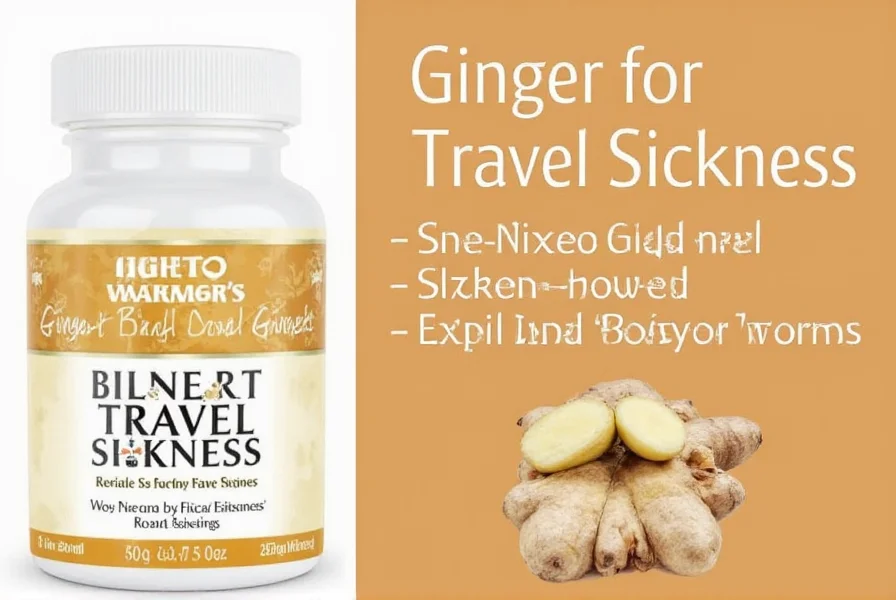Travel sickness affects millions of people worldwide, causing nausea, dizziness, and discomfort during car rides, flights, and boat journeys. Many travelers seek natural alternatives to prescription medications, and ginger has emerged as one of the most researched and effective options. Unlike some over-the-counter remedies that cause drowsiness, ginger provides relief without sedative effects, making it ideal for travelers who want to stay alert during their journey.
The Science Behind Ginger and Motion Sickness
Ginger (Zingiber officinale) contains active compounds called gingerols and shogaols that interact with the gastrointestinal system and central nervous system. These compounds help regulate serotonin levels and reduce inflammation in the digestive tract—key factors in motion sickness development.
A comprehensive review published in Travel Medicine and Infectious Disease analyzed multiple clinical trials and concluded that ginger significantly reduces symptoms of motion sickness compared to placebo. In one double-blind study, participants who consumed 1 gram of ginger powder before a simulated boat ride experienced 38% less nausea and 56% fewer episodes of vomiting than the control group.
How Ginger Compares to Pharmaceutical Options
While medications like dimenhydrinate (Dramamine) and scopolamine patches remain the gold standard for severe motion sickness, ginger offers a valuable alternative with fewer side effects. The following table compares key characteristics:
| Remedy Type | Effectiveness | Onset Time | Common Side Effects | Drowsiness Risk |
|---|---|---|---|---|
| Ginger (1-2g) | Moderate for mild-moderate cases | 30-60 minutes | Rare mild heartburn | None |
| Dimenhydrinate | High for most cases | 30-60 minutes | Dry mouth, blurred vision | High |
| Scopolamine patch | Very high | 4-6 hours | Dry mouth, dizziness | Moderate |
Effective Forms of Ginger for Travel Sickness
Not all ginger products deliver the same results. Research indicates these forms work best for preventing and treating motion sickness:
- Fresh ginger root: 1-2 grams chewed or steeped in hot water (most effective form)
- Ginger capsules: Standardized to contain 5% gingerols (1-2 grams total)
- Ginger chews/candies: At least 250mg of real ginger per serving
- Ginger tea: Brewed from fresh or dried root (avoid weak commercial blends)
Be cautious with processed ginger products—many commercial "ginger" candies contain mostly sugar with minimal actual ginger. Look for products listing ginger as the primary ingredient with specific milligram amounts.

Optimal Dosage and Timing
Research consistently shows that timing and dosage significantly impact ginger's effectiveness for motion sickness:
- Preventive approach: Consume 0.5-2 grams of ginger 30-60 minutes before travel begins
- During travel: Take additional 0.5-1 gram doses every 4 hours if symptoms develop
- For severe cases: Combine with non-pharmaceutical strategies like focusing on the horizon
A 2022 study in The Journal of Travel Medicine found that 1.2 grams of ginger taken 45 minutes before a boat trip provided optimal protection against seasickness, with effects lasting up to 4 hours. The study noted that doses below 0.5 grams showed minimal benefit, while doses above 2 grams didn't significantly increase effectiveness but raised the risk of mild gastrointestinal discomfort.
Safety Considerations and Who Should Avoid Ginger
Ginger is generally safe for most adults when used in recommended amounts for travel sickness. However, certain individuals should exercise caution:
- People taking blood thinners (ginger has mild anticoagulant properties)
- Those with gallstone disease (ginger may increase bile production)
- Pregnant women beyond the first trimester should consult a physician
- Individuals scheduled for surgery within two weeks
Unlike many motion sickness medications, ginger doesn't cause drowsiness, making it ideal for drivers and pilots. However, it's not recommended as the sole remedy for severe motion sickness during extended sea voyages or turbulent flights where pharmaceutical options might be necessary.
Practical Tips for Using Ginger While Traveling
Implement these evidence-based strategies to maximize ginger's effectiveness for your next trip:
- Prepare ginger tea bags by steeping fresh slices in boiling water before your journey
- Carry ginger chews containing at least 250mg of real ginger per piece
- Combine ginger with acupressure wristbands for enhanced effectiveness
- Avoid heavy meals before travel—ginger works best on a partially full stomach
- Stay hydrated with water, but avoid carbonated beverages which may worsen symptoms
For long journeys, consider a combination approach: use ginger preventively and keep pharmaceutical options as backup for severe symptoms. This strategy provides the benefits of natural relief while ensuring protection if motion sickness becomes overwhelming.

Conclusion
Ginger represents one of the most scientifically supported natural remedies for travel sickness, particularly for mild to moderate cases. While not as potent as some pharmaceutical options for severe motion sickness, its effectiveness combined with minimal side effects makes it an excellent first-line defense for many travelers. By understanding the proper forms, dosages, and timing, you can harness ginger's natural properties to make your journeys more comfortable without drowsiness or significant side effects. For best results, combine ginger with other non-pharmaceutical strategies like proper seating position and visual focus techniques.
How much ginger should I take for motion sickness before traveling?
Research shows that 0.5-2 grams of ginger taken 30-60 minutes before travel provides optimal protection against motion sickness. For most adults, 1 gram (about 1/2 teaspoon of powdered ginger or a 2-inch piece of fresh root) is effective for journeys up to 4 hours. Higher doses don't significantly increase effectiveness but may cause mild stomach discomfort in some people.
Does ginger work as well as Dramamine for travel sickness?
Ginger is generally less effective than Dramamine for severe motion sickness but works well for mild to moderate cases. The key advantage of ginger is that it doesn't cause drowsiness, making it better for drivers or those who need to remain alert. For short trips or mild sensitivity, ginger often provides sufficient relief without pharmaceutical side effects.
What's the best form of ginger for preventing car sickness?
Fresh ginger root (chewed or as tea) and standardized ginger capsules (providing 1-2 grams of ginger with 5% gingerols) are the most effective forms. Many commercial ginger candies contain insufficient active compounds—look for products specifying at least 250mg of real ginger per serving. For immediate relief during travel, ginger chews designed for motion sickness are most practical.
How long before travel should I take ginger for maximum effectiveness?
For optimal results, consume ginger 30-60 minutes before your journey begins. This allows time for the active compounds to enter your bloodstream before motion exposure. If using fresh ginger tea, 45 minutes before travel provides peak effectiveness based on pharmacokinetic studies of ginger compounds.
Can children use ginger for motion sickness?
Children over 2 years can use ginger for motion sickness at reduced doses: 2-4 mg per pound of body weight (maximum 1 gram total). Consult a pediatrician before use, especially for children under 6. Ginger chews designed for kids or diluted ginger tea are preferable to capsules for younger travelers. Never give raw ginger root to young children due to choking risk.
Frequently Asked Questions
How much ginger should I take for motion sickness before traveling?
Research shows that 0.5-2 grams of ginger taken 30-60 minutes before travel provides optimal protection against motion sickness. For most adults, 1 gram (about 1/2 teaspoon of powdered ginger or a 2-inch piece of fresh root) is effective for journeys up to 4 hours. Higher doses don't significantly increase effectiveness but may cause mild stomach discomfort in some people.
Does ginger work as well as Dramamine for travel sickness?
Ginger is generally less effective than Dramamine for severe motion sickness but works well for mild to moderate cases. The key advantage of ginger is that it doesn't cause drowsiness, making it better for drivers or those who need to remain alert. For short trips or mild sensitivity, ginger often provides sufficient relief without pharmaceutical side effects.
What's the best form of ginger for preventing car sickness?
Fresh ginger root (chewed or as tea) and standardized ginger capsules (providing 1-2 grams of ginger with 5% gingerols) are the most effective forms. Many commercial ginger candies contain insufficient active compounds—look for products specifying at least 250mg of real ginger per serving. For immediate relief during travel, ginger chews designed for motion sickness are most practical.
How long before travel should I take ginger for maximum effectiveness?
For optimal results, consume ginger 30-60 minutes before your journey begins. This allows time for the active compounds to enter your bloodstream before motion exposure. If using fresh ginger tea, 45 minutes before travel provides peak effectiveness based on pharmacokinetic studies of ginger compounds.
Can children use ginger for motion sickness?
Children over 2 years can use ginger for motion sickness at reduced doses: 2-4 mg per pound of body weight (maximum 1 gram total). Consult a pediatrician before use, especially for children under 6. Ginger chews designed for kids or diluted ginger tea are preferable to capsules for younger travelers. Never give raw ginger root to young children due to choking risk.











 浙公网安备
33010002000092号
浙公网安备
33010002000092号 浙B2-20120091-4
浙B2-20120091-4